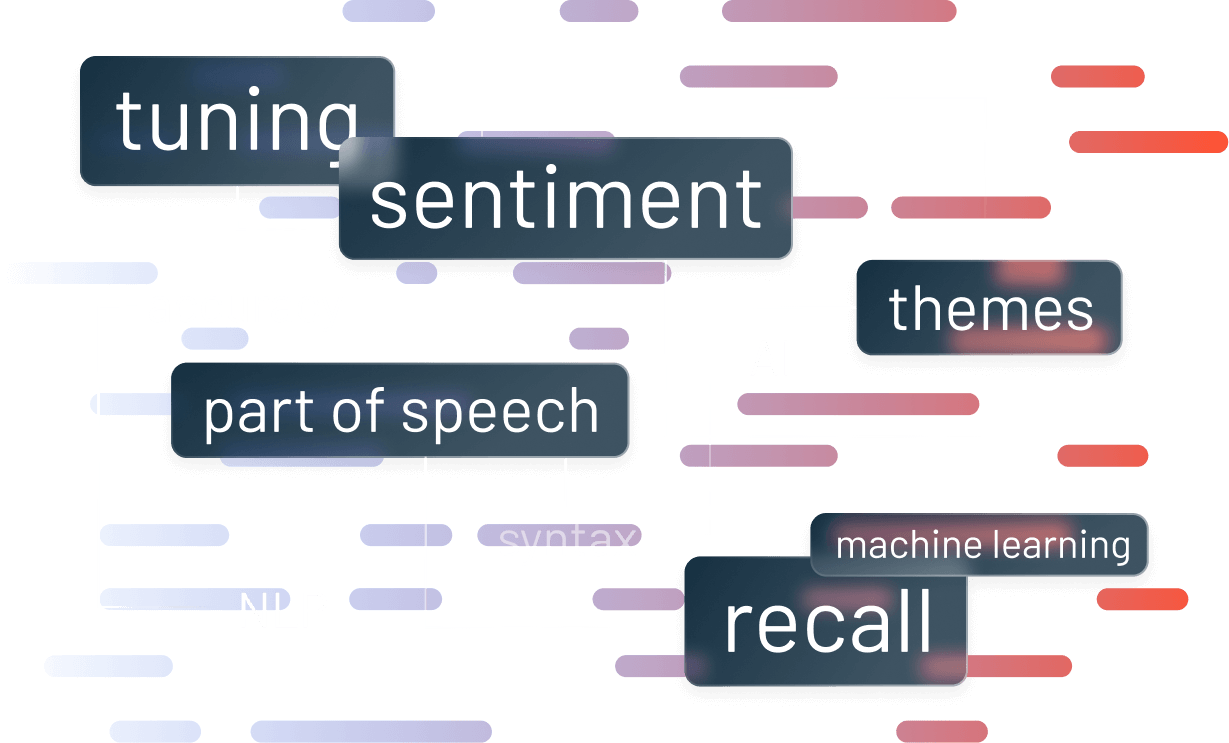LEXALYTICS, AN INMOMENT COMPANY
We Process Billions of Unstructured Documents Every Day, Globally.
We are the industry leader in translating text into profitable decisions; we make state-of-the-art cloud and on-prem natural language processing and machine learning technologies that transform text data into powerful stories and actionable insights.
Our products combine natural language processing with artificial intelligence to transform text in all its forms into usable data. Lexalytics solutions can be deployed on premises with Salience™, in the cloud or within a hybrid cloud infrastructure with our SaaS Semantria™ solution to reveal context-rich patterns and insights for voice of customer, voice of employee, customer experience improvement, market research, social listening, news monitoring and other business intelligence programs.
The World's Best Companies Use Lexalytics
History In the Making
Lexalytics Over the Years
2023
Recognized for Artificial Intelligence Innovation in 2023 AI Breakthrough Awards for Best Overall NLP Company
2022
Lexalytics expands its OEM partnership ecosystem as Bright chooses Lexalytics’ AI-based NLP engine to power its immersive learning platform
2021
InMoment completes acquisition of Lexalytics, the leader and pioneer of structured and unstructured data analytics. Lexalytics makes the KMWorld AI50 list for companies empowering intelligent knowledge management
2018-2020
Lexalytics was acknowledged as a representative vendor in the Gartner 2020 Market Guide for Text Analytics. Lexalytics was recognized in Gartner Hype Cycles for Data Science, Machine Learning, and Business Intelligence
2011-2017
Lexalytics is the first company to cleanly support private, public, and hybrid cloud text analytics infrastructures. Lexalytics ships machine learning based named entity extraction, and world’s first Twitter/microblog specific text analytics
2004-2010
Lexalytics was founded by Jeff Catlin and Mike Marshall. Lexalytics launches world’s first commercial sentiment analysis engine
AI Research
Fast & Efficient AI Solutions for Any Organization
The power of artificial intelligence is in how the combination of the right technology and people can massively reduce the time it takes to deliver quantifiable business outcomes from a large quantity of data. The Lexalytics AI Lab aims to provide flexible machine learning systems that work with humans to produce specific AI solutions for solving business problems at any scale.


Through our partnership with the University of Massachusetts Amherst’s Center for Data Science, Lexalytics works with faculty and staff on solving the underlying challenges to make the AI building process easier.
Swarm Intelligence/Emergent Behavior
We’re developing AI “modules” that act together to form an intelligence that’s greater than the sum of its parts. Each module has a specific functionality (such as training a deep learning model, or providing an interface), and can be swapped out or rearranged relative to other modules. Individual modules are fully functional and provide value on their own, but their real power is in how they work together to achieve whatever larger AI functionality you desire. This modular method will revolutionize how AI implementations are conceived and constructed at any scale.
Adaptive AI
The type and quantity of information being processed are essential factors in choosing a machine learning model, but data flow isn’t always consistent. A machine learning algorithm that suits today’s dataset may be sub-optimal tomorrow. Instead of stubbornly sticking with one algorithm, we believe in flexibility. Like humans, computers should change their approach when presented with new information under new conditions. We’re working towards a fully adaptive AI that will start from scratch using one model and then, without a human telling it to do so, swap algorithms when it determines that a different model will provide better results.
Explainable, Fair AI
If AI is going to help humans with critical tasks, we must be confident in both its abilities and its lack of harmful social biases. Explainable AI techniques, approaches to monitoring and fixing harmful behaviors, and causal modeling to create understandable and generalizable rules are all critical research areas we’re following and advancing.





